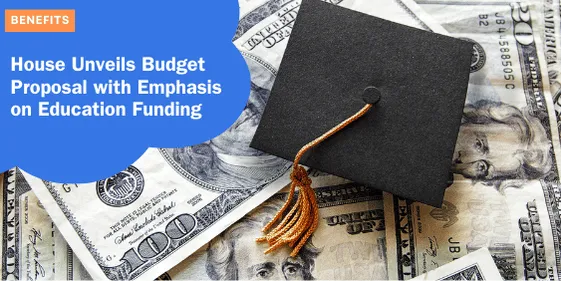House Unveils Budget Proposal with Emphasis on Education Funding

The latest budget draft from the House, released on Monday night, places a significant emphasis on education funding and improving state agency salaries.
This initial draft follows a series of stalled negotiations between the House and Senate, causing the House to independently present its proposal.
Key Elements of the Budget Proposal
The House’s proposed budget includes several notable adjustments aimed at uplifting the state’s educational framework and addressing salary concerns across various state agencies.
The main highlights are:
- Starting Teacher Salary Increase: The starting salary for teachers would be raised to $44,000.
- Restoration of Master’s Pay for Teachers: Teachers holding a master’s degree in their field of teaching would see their additional qualifications financially recognized.
- Cost of Living Adjustment (COLA) Bonus: An extra 2% COLA bonus would be allocated for state retirees.
- Raise for Correctional Officers: Correctional officers would receive an additional 9% salary increase.
- Full Funding for Opportunity Scholarships: The budget proposes complete funding for Opportunity Scholarships.
- Childcare Stabilization Grants: There would be a $135 million handout for childcare stabilization grants.
Enhanced Education Funding Details
The emphasis on educational enhancement is one of the key aspects of the budget proposal.
Not only does it include significant raises for starting teachers, but it also restores the master’s pay, which has been a contentious topic in previous legislative discussions.
Starting Teacher Salaries
The proposed budget will increase the starting salary for teachers from $39,000 to $44,000, a substantial rise from the expected boost to $41,000 this year as per the 2023 budget.
This marked increment signifies a focused effort to attract and retain qualified educators within the state.
Furthermore, every teacher would receive a minimum increment of 1% at every step of the salary schedule, costing the state approximately $103 million to implement.
Opportunity Scholarships
Opportunity Scholarships have been earmarked for full funding under this budget adjustment.
Previously, funding covered only the first tier and parts of the subsequent tiers.
The new proposal would allocate $480 million to fund the remaining portions of tier two fully, along with additional support for Education Savings Accounts.
Speaker Tim Moore, R-Cleveland, stressed the importance of empowering parents to make the best educational choices for their families, asserting that the budget not only raises teacher pay but ensures that every public school classroom has a highly compensated qualified teacher.
State Employee Salary Adjustments
The proposed budget extends salary increases across all state agencies.
Notably, employees certified in the Department of Adult Corrections (DAC) would see the most significant raise due to staffing shortages.
While these positions were initially set to receive a 4% raise, the budget proposes an additional 9%, resulting in a total of approximately 12% increase from the fiscal year 2023 to 2024.
This includes Correctional Officers, Probation and Parole Officers, and DPS Juvenile Justice positions, among others.
All state agency employee salaries would increase by an additional 1%, raising the increment from 3% to 4%.
Childcare Funding and Federal Grant Adjustments
The expiration of federal childcare stabilization grants at the end of June has prompted the state to step in.
The proposed budget includes $135 million for childcare stabilization grants to ensure that childcare providers remain financially supported even after federal grants lapse.
Strategic Use of Reserves
To bolster economic development and address Medicaid shortfalls, the House proposes drawing from targeted reserves.
Randolph County, home to Toyota’s manufacturing facilities, would benefit from $150 million directed from the Economic Development Reserve, which would specifically fund transportation infrastructure around the area.
Additionally, $350 million from the Medicaid Contingency Reserve is allocated to cover the unexpected rise in Medicaid costs, ensuring the continuity of essential services.
Statements from Budget Proponents
North Carolina House Budget Chair Rep. Dean Arp, R-Union, emphasized the budget’s prudence amidst economic uncertainty.
He expressed, “During a period of economic uncertainty, this House budget limits the growth of spending while addressing our state’s most urgent needs.”
The utilization of reserves for economic development and Medicaid stabilization underscores a cautious yet strategic approach, leaving the Savings Reserve untouched and maintained at record highs.
Financial Prudence and Negotiation Prospects
The House’s budget proposal draws from the state’s $1.4 billion surplus and designated reserve accounts, leaving nearly $100 million in excess funds.
These unallocated funds could serve as leverage in upcoming negotiations with the Senate.
Should the Senate engage, the budget proposal will likely undergo several revisions.
Nevertheless, Senate leadership has expressed concerns about potential overspending, indicating that careful deliberation will be necessary to reach a consensus.
Conclusion: A Comprehensive Commitment to Education and Employment
The House’s budget proposal markedly prioritizes education funding while also addressing broader state workforce needs.
By increasing teacher salaries and restoring master’s pay, the budget aims to improve the quality of education and acknowledge the professional contributions of educators.
Additionally, the proposed comprehensive funding for Opportunity Scholarships underscores a dedication to providing families with the freedom to choose the best educational pathway for their children.
Simultaneously, the planned salary increments for state employees, particularly within the Department of Adult Corrections, demonstrate a commitment to addressing workforce shortages and ensuring fair compensation.
As the budget proposal moves forward, coordination and negotiation between the House and Senate will be crucial.
The outlined provisions signify a fundamental step towards enhancing the state’s educational framework and addressing critical employment concerns, all while maintaining fiscal responsibility amidst uncertain economic times.
By adopting a balanced approach that integrates educational improvements with strategic financial planning, the House budget proposal sets the stage for a more robust and equitable state fiscal year.
This proposal not only addresses immediate needs but also lays the groundwork for long-term growth and prosperity for North Carolina.






